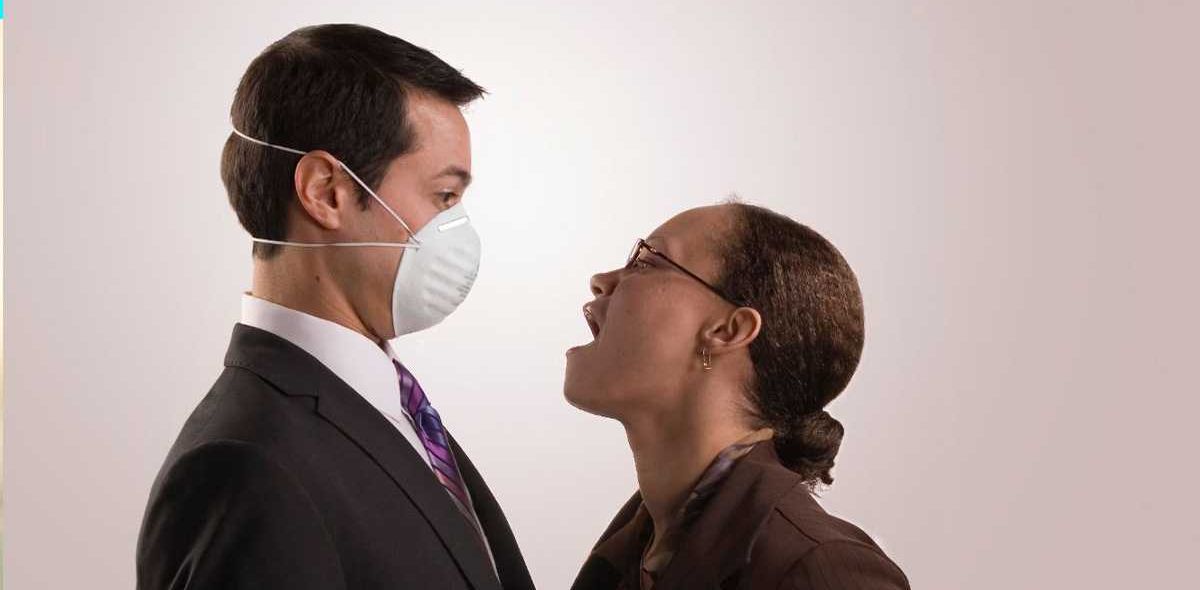Have you ever taken a deep breath at your desk and wondered if someone nearby had a hygiene issue?Poor body hygiene can make any workplace a very difficult to perform in. A person with body odor, bad breath, or messy, smelly unclean clothing can have a dramatic, negative effect on potential customers and the workspace.
Not every situation requires the involvement of the Human Resources Department (HR), but sometimes it will be necessary to speak with them. If you're up to the challenge and willing to maintain a respectful and direct attitude, six steps can quickly resolve an inconvenient problem (more on that below).

A recent thread on r/AskReddit posed a somewhat uncomfortable yet sometimes necessary question: "How do you tell a coworker their personal hygiene is a problem?"
Redditors promptly began sharing some of their own personal stories about dealing with the unwanted situation. They offered humorous and helpful commentary on everything from health practices to direct approaches to the problem. There are some important things to consider when it comes to how we can best cope with and address unwanted odors and behaviors at work.

How do people feel about hygiene problems at work?
You never know what someone's circumstances actually are. User NOT-packers-fan2022 had an insightful excuse, writing, "I lost my smell due to Covid, please f*****g tell me ASAP!!! I can't smell it myself."
Offering some strong advice was user EternallyMustached, who shared, "You have to be simple and direct without resorting to shame and/or ridicule."
User Dr-Figgleton captured the right tone, saying, Hygiene talks are brutal for both sides, so you have to come in with empathy, not embarrassment."
Some fair advice from user Anonymoosehead123 was, "Are you their supervisor/manager? If not, I don't think it's your responsibility to have this conversation with them."
User samuraiseoul offered compassion to the employee attempting to do something, saying, "Having any kind of sensory overload is a pain in the a$ to deal with and you deserve an environment where you don't have to put up with that."
"I worked with a guy who had grown up in a culture where bathing regularly wasn't common, and apparently no one had mentioned the terrible BO to him in the several years he had been in the US," said iamtheOtherOne, giving a reasonable excuse for the workspace scenario.

User Seven_bushes shared, "We had an engineer who stank at 30 paces. Turns out it was a medical problem he had no control over. Taught me to stop expecting that it was someone's responsibility to make everything pleasant for me."
Giving their own experience with bad breath was user Ridiculousmr, who wrote, "I have this issue every day, if it’s bad breath you offer them gum a lot and become the gum guy at the office."
"Pull her aside and be honest but kind say there’s been a noticeable smell and you wanted to let them know privately in case they weren’t aware," was solid advice from user nolniro.

Six rules to follow when approaching a coworker over hygiene
Workplace hygiene issues are more common than you might expect. It's essential to determine whether it's in your and your coworkers' best interest to have this conversation. An unnecessary interaction will create a challenging scenario that was never necessary. These six guidelines can help make this situation easier to deal with for everyone:
- Is it a consistent problem? — One or two isolated instances don't warrant a conversation. Be clear to yourself about what you've actually observed. A strong body odor affecting the shared workspace is different than you smell something bad. Also, there may be an underlying health or disability issue, which would suggest involving Human Resources.
- Be aware of your tone. — There is no need to embarrass someone or yourself. Avoid raising the issue in front of other coworkers. Be calm and respectful, maintaining a non-judgmental attitude. An article by go2HR suggests choosing your language carefully and being clear, direct, and truthful.
- Address the behavior, not the person. — Address the observable behavior without making judgments of the person. "I've noticed your clothes seem unwashed frequently." Avoid assuming there's a motive.
- Allow for a conversation to understand underlying causes — Invite the coworker to share their own perspective. Ask if they are aware of the issue. A 2022 article by HR Grapevine suggests the conversation aims to find a resolution and change the behavior.
- It's completely fair to have expectations for change — It's normal to want a workspace that's comfortable for everyone. Expecting coworkers to wear clean clothing and deodorant, and to maintain reasonable oral hygiene, is normal. Offering support and a willingness to help them pick out items or discuss a routine if they're up for it is a kind thing to do.
- Be respectful and maintain confidentiality — It's better to avoid making everyone aware of the issue. Saying others are complaining is only going to add embarrassment and make it a bigger problem than necessary. A 2024 article in Peninsula states the goal is improvement, not punishment.



















 Volunteer work.Photo credit
Volunteer work.Photo credit  Putting the puzzle together.Photo credit
Putting the puzzle together.Photo credit  Woman and her equations.Photo credit
Woman and her equations.Photo credit  A colorful mind.Photo credit
A colorful mind.Photo credit  A happy business team.Photo credit
A happy business team.Photo credit 

 A happy entrepreneur at workCanva
A happy entrepreneur at workCanva
 A car with LED headlightsCanva
A car with LED headlightsCanva

 A confident woman gives a speech in front of a large crowdCanva
A confident woman gives a speech in front of a large crowdCanva

 Creativity and innovation are both likely to become increasingly important for young people entering the workplace, especially as AI continues to grow.
Creativity and innovation are both likely to become increasingly important for young people entering the workplace, especially as AI continues to grow.